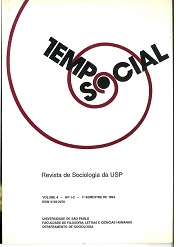The experience of insecurity: work and family in the urban working-class
DOI:
https://doi.org/10.1590/ts.v4i1/2.84911Keywords:
Working class families, Experience, Privatization, Citizenship, Insecurity, ExclusionAbstract
The article treats the importance of the family in the urban working classes. As value and space of sociability, this importance is constructed in a social experience where work, culture and the (not) rights are articulated. From this angle the family is defined as order of life in which we find signals of a social exclusion that unfold itself in a privativeness of experiences, it is this privativeness that the article try to show and to discuss. In this sense, it tooks as point of depart the trajectory of men, women and children in the work market. Less than a discussion on the work market, these trajectories are interesting mainly from the point of view by which they are elaborated as individual and colective experiences in the family ambit. As empirical reference the article analyzes data from a survey realized by DIEESE in 1981, in the Metropolitan Region of São Paulo.Downloads
Download data is not yet available.
Downloads
Published
1992-07-06
Issue
Section
Dossiê Modos de Vida
License
Copyright (c) 1992 Tempo Social

This work is licensed under a Creative Commons Attribution-NonCommercial 4.0 International License.
How to Cite
Telles, V. da S. (1992). The experience of insecurity: work and family in the urban working-class. Tempo Social, 4(1/2), 53-93. https://doi.org/10.1590/ts.v4i1/2.84911


